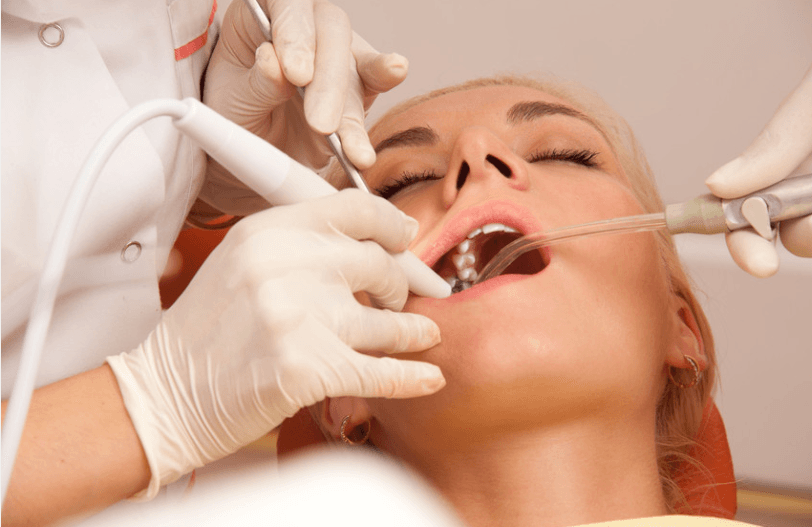Will my insurance cover this?
April 22, 2021
Why dental insurance should never dictate your treatment
"I don’t want to schedule that crown today if my insurance is not going to cover 100%."
Unfortunately, this is the feedback that we receive from patients all of the time. Sometimes we hear this when it comes to x-rays, exams, or treatment that the doctor is recommending. It helps me realize that we have not done a good enough job educating our patients about their dental needs and the potential outcome if they do not have treatment done. It is difficult trying to explain to people that their dental insurance companies cannot see what we see in order to determine what is needed to properly treat and diagnose a person including something as simple as x-rays. I often wonder how many things like that get missed because of the misconception that if insurance doesn’t cover it, we shouldn’t be doing it. When the truth is, insurance companies are making business decisions, while we are making health decisions.
It wasn’t too long ago that having dental insurance was viewed as a great benefit…a “must have”. Over the years, there have been small changes that have had an impact on both the patient and the providers of care. Not all change is good or bad, it is just different and it is our job, as patients and providers, to work together to maximize your dental benefits while putting patient care first.
While treatment is our number one priority, I have compiled a list of information, to help you navigate your insurance, based on some commonly asked questions:
Q: What is the difference between and “in network provider" and "out of network provider”?
A: An “in network” provider has signed an agreement with an insurance carrier, accepting fees set forth by contract. An “out of network” provider has NOT signed an agreement with the carrier. This means the patient is responsible for the difference between what the dentist charges and what the insurance company pays. It is important for you to understand that some plans will let you go out of network and some won’t. However, you will benefit most if you visit an in network provider! We strongly encourage you to check with your insurance company prior to your visit to inquire of any restrictions.
Q: What are the top reasons we see insurance claims denied?
A: Filing limit timed out: It is very important for you to provide your dental office with new insurance information as soon as you have it so that we can update your file and avoid delays or worse non-payment of claims. Insurance companies often set filing limits on claims. These can vary anywhere from 3 months to 24 months. Once the clock runs out on the claim, the insurance company will deny it, causing the patient to pay 100% of the service.
A: Annual maximum dollars used: You should know your calendar year maximum. A calendar year is a benefit dollar amount set forth by your insurance carrier, usually per person. Once the dollar amount is met, you are responsible for any other out of pocket costs for the year, including preventive care visits.
A: Not a covered service or plan benefit: You should have an understanding of your dental insurance benefits. Most dental insurance companies have websites where you can access your individual plan benefits. Most insurance websites offer helpful information such as: benefit periods, covered procedures, deductible information, calendar year maximums and frequencies.
We cannot stress enough the importance of creating and maintaining a dialogue with your insurance carrier and that you should be your own best advocate. Check and make yourself aware of any waiting periods or restrictions on your plan. We do our very best to help you maximize your insurance benefits, ultimately however the relationship lies with you and your carrier but please put your treatment above all else. We are always here to help!

We understand that we are in the midst of a concerning, confusing time. Our office wants to ensure that our patients and staff stay healthy. Starting tomorrow we will be cancelling all appointments through the end of March. Those of you with appointments in the next two weeks our team will be reaching out to reschedule to a later date. We will be available daily at the office for EMERGENCIES ONLY from 9:00 AM- 2:00 PM. We have the following procedures in place: We continue to disinfect our treatment rooms in between each patient. This includes disinfecting the exam chair, work surfaces, light handles, and instruments. We continue to use rubber dams for most patient procedures, vacuums and suction, use of eye wear and masks for the staff; all of which reduce potential spread and infection of any illness within our office. We are increasing the frequency in which we are disinfecting the patient lounge, pens, clipboards, and beverage station. We are screening patients to determine risk for ANY seasonal infections, but also for COVID-19. We thank you in advance for understanding if we ask you to reschedule your appointment. We are temporarily a “no handshake” environment for the safety of our patients. Dr. Maricarmen says feel free to “elbow bump” her! We have moved our air purifier to the waiting room as a preventative measure. We ask that our team members and patients follow these procedures: Please wash your hands prior to entry of our office and use hand sanitizer upon your arrival. If you are sick, exhibiting any symptoms of a virus, have been exposed to a COVID-19 patient, or have traveled outside of the country, please call us to reschedule your appointment. Cover your cough or sneeze with a tissue and dispose of it immediately. Avoid touching your face and mouth. We appreciate your cooperation at this time and thank you for your understanding. Our staff will keep you updated to any changes.

Summer time is officially here! This means having fun in the sun with your friends and families at parties, barbecues, at the beach, and more! While it’s certainly a time to celebrate and have a great time since school and other obligations are put on hold, there’s one thing that we want to protect and that’s your smile. Your Syracuse dentist will discuss how to keep up with your dental and oral hygiene and care this summer. Find a Healthy Diet and Stick With It! We understand that it can be easy to fall into a bad diet during the summer. With all of the barbecues and backyard parties full of snacks, sweets and treats, it’ll certainly be difficult to ignore it. While it’s fun to splurge, make sure that you’re still eating right for a majority of your meals. This means limiting the amount of snacking that you’re doing—if you can’t help but snack, try to replace the chips and candies with celery, carrots, or other healthy vegetables! It also highly recommended not to eat very late at night, especially if you plan on going to bed relatively soon. You’re allowing the bacteria and food particles to linger in your mouth overnight instead of giving your body time to properly digest. If you eat and then go to bed, you’re also skipping your nightly brushing routine, making it easier for your teeth to suffer from cavities and potential decay. Eat at appropriate times and don’t forget to brush and floss your teeth before you go to bed to protect your smile! Drink Water—Lots of It It’s no secret that summertime can bring some of the hottest recorded temperatures around, which is why it’s important to stay hydrated. This won’t only help your dental health, but it’ll help your overall health, too! In between meals, try to consume as much water as possible, since there are many popular drinks that can cause you to dehydrate or dry out your mouth (coffee, sodas, sports drinks, alcohol). Protect Your Teeth as You Play Sports Summer is a great time to participate in a number of sports activities, like baseball, soccer, football, and more! But accidents can happen and your teeth can easily suffer from a hit. Most dental injuries in children are sports related, so we recommend using mouth guards for these times. There is no intention of anyone getting hurt, but that doesn’t mean it can’t potentially happen! Your teeth will thank you in the morning. If you want to learn some more helpful summer tips about protecting your smile, or if you’d like to make an appointment for your bi-annual check-up, don’t hesitate to call ProSmile Dentistry at (315)475-4559 today! We wish you a happy, safe and healthy summer!









Share On: